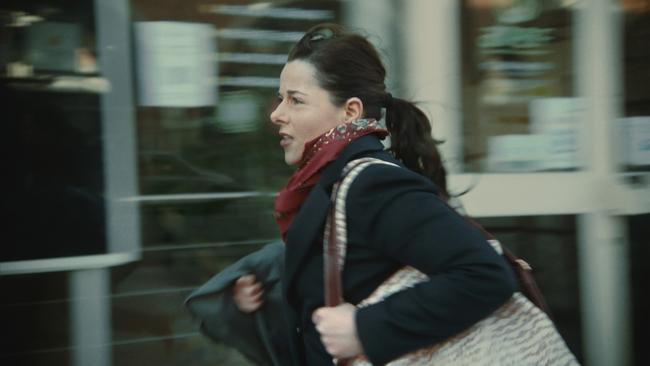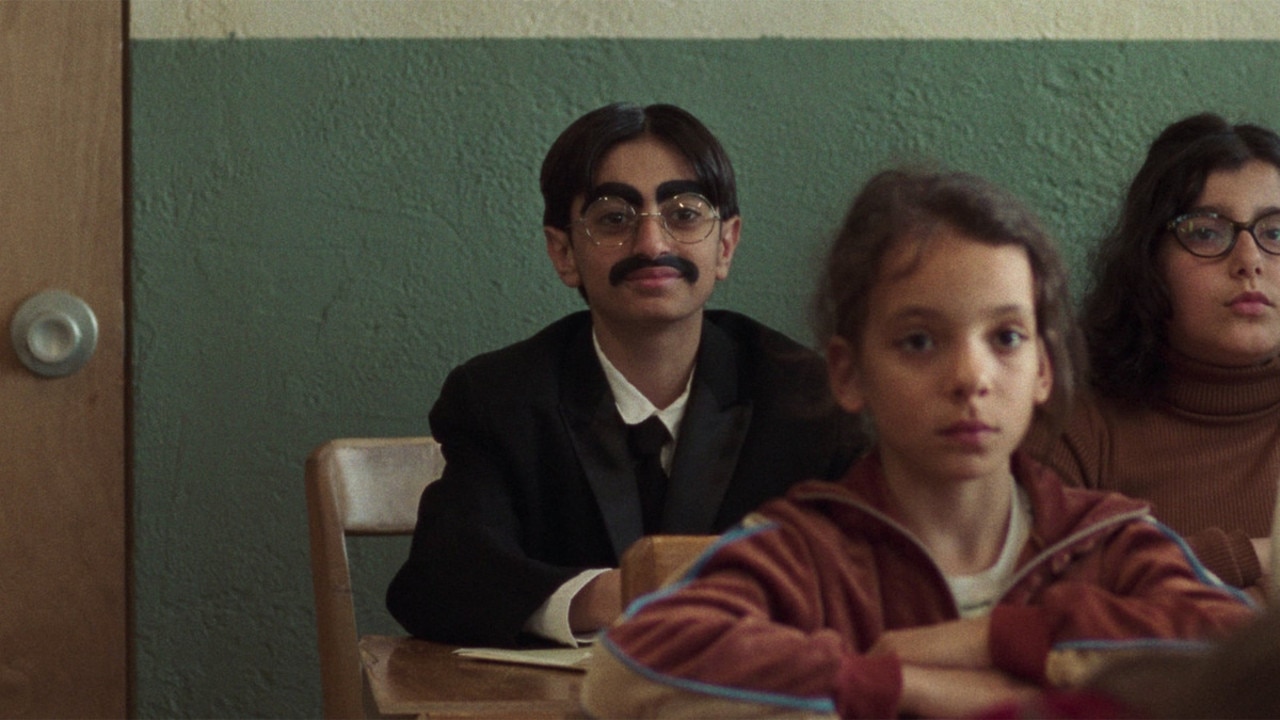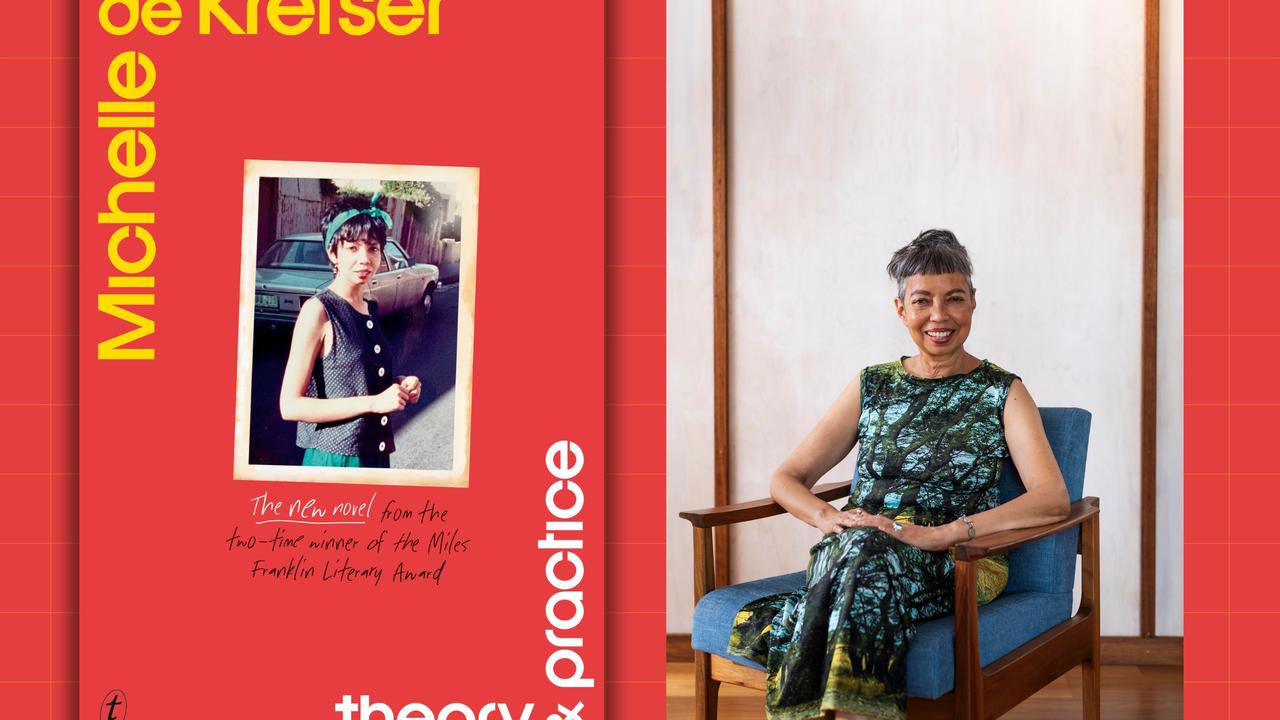Fans of Netflix series Maid will love French film Full Time
Single mother Julie races against the clock everyday to pick up her children in heartfelt ‘commuting thriller’ Full Time. Their father won’t even pick up the phone.

Full Time (A plein temps) (M)
In cinemas
★★★★
Julie Roy (Laure Calamy), the protagonist in cinematographer-turned-director Eric Gravel’s superb Full Time, finds herself in the sort of predicament that is all too common in big cities right now. The vivid realism of the film, and the nuances of Calamy’s performance, will be familiar to commuters who battle every day to get to work on time. Gravel’s achievement, and it’s a considerable one, is to transform such a mundane, everyday routine as commuting into a kind of thriller.
Julie is the single mother of two small children. Her ex-partner is not supporting her financially and never answers his phone. She lives in the outer suburbs of Paris because only there can she afford accommodation, but she’s behind with her mortgage payments. Every weekday morning her alarm goes off before dawn and she and the kids have a quick breakfast before she delivers them to her neighbour, Madam Lasigny (Genevieve Mnich), an elderly woman who is increasingly finding looking after them an imposition. Then Julie takes a train into the centre of Paris where she works as chief chambermaid at a five-star hotel, though she’s angling for a job in a marketing company and is hoping to be granted an interview.
Under normal circumstances Julie is able to do her work and get back to the suburbs in time to spend evenings at home with the children. But when there’s a strike on both trains and buses her routine is thrown into chaos. She tries desperately to get to work on time, begging for lifts and even hitchhiking if she has to. Her boss, Sylvia (Anne Suarez), takes no account of the industrial action that is paralysing the city; she expects her employees to clock in on time, and increasingly the hapless Julie is late.
To add to her woes she’s expected to train a new chambermaid, Lydia (Mathilde Weil), who hasn’t worked in a first-class hotel before. And she also has to cope with some of the guests who stay in this elegant hotel and who sometimes behave very badly.
Julie’s dilemma is expertly illustrated by both the actor and the director. The film is shot and edited with flawless precision and the young woman’s battles against the unreliable transport system are accompanied by a furious, driving music score composed by Irene Dresel that adds to the urgency of the drama. Transforming such a mundane, commonplace subject – the woes of the commuter – into a nailbiting exercise in suspense is no small achievement and this modest but impressive film is a vivid demonstration that, in the right hands, a “small” subject can make a major impression.
-
The Black Phone (MA15+)
In cinemas
★★½
The principal mystery of The Black Phone is why an actor as talented as Ethan Hawke took the role of The Grabber, a serial killer of young boys who wears a face covering similar to the horned demon masks of Japanese mythology.
The film, based on a short story by Joe Hill and directed by Scott Derrickson, is set in Denver in 1978. Finney (Mason Thames), 13, lives with his sister, Gwen (Madeleine McGraw), and abusive father (Jeremy Davies). A baseball star, Finney is nevertheless bullied by other boys at school, though his friend Robin (Miguel Cazarez Mora) protects him. Soon after Robin disappears, a victim of The Grabber, Finney also is kidnapped and finds himself trapped in the killer’s basement.
Most of the film plays out in this dismal setting as the unfortunate Finney tries desperately to escape. Attached to one of the cellar walls is an old-fashioned dial telephone that, The Grabber tells Finney, doesn’t work yet it rings regularly, adding a supernatural dimension to the drama. But as a thriller, this is pretty underwhelming; genuine suspense is at a premium and the occasional shock is telegraphed well in advance. The young actors rise above their material, but Hawke is wasted as the killer.
-
Murder Party (M)
In cinemas
★★½
Possibly inspired by the success of Knives Out (2019), the French comedy-thriller Murder Party starts off intriguingly as a whodunit set in a remotely located mansion.
Architect Jeanne (Alice Pol) receives a commission to redesign the home of Cesar Daguerre (Eddy Mitchell), who is famous for designing elaborate board games.
At the Daguerre mansion, Jeanne is introduced to Theo (Pablo Pauly), Cesar’s son; Salome (Pascale Arbillot), a writer of mystery stories; Jo (Miou-Miou), Cesar’s financial adviser; flirtatious Lena (Sarah Stern); and to Armand (Gustave Kervern), the butler, who seems on intimate terms with female members of the family.
After the sudden death of Cesar, a mysterious voice announces that everyone has to play a game to discover the identity of the killer.
There’s no escape from the house – the only way out is wired to deliver an electric shock – and anyone who doesn’t play the game will die.
So far so good. Director and co-writer Nicolas Pleskof has established a classic situation (Agatha Christie is duly name-checked) with a colourful cast of characters – literally, in that the suspects are colour-coded (Salome is dressed in red, Lena in green, Jeanne in blue). But after this promising start the film loses its way, getting bogged down in increasingly absurd developments. The promise of the early scenes is frittered away long before the unlikely conclusion.

-
Night Raiders (M)
In cinemas
★★
Although to some extent this dystopian thriller follows a familiar path, the Canadian-New Zealand co-production, which has director Taika Waititi as one of its executive producers, carries with it a modest level of originality thanks to its concentration on the struggles of Indigenous people. Though the setting is Canada, the story, which involves the kidnapping of an 11-year-old North American girl who is placed in a sinister institution to be “assimilated” evokes, for an Australian audience, obvious links to the Stolen Generation.
In this case the authorities responsible for taking the girl, and many other children, are the Jingos who – in this future world (2043), which has been virtually laid waste by war and a deadly virus – use drones to locate their prey.
The film begins as Niska (Elle-Maija Tailfeathers) and her daughter, Wassese (Brooklyn Letexier-Hart), are in a forest, fleeing from the Jingos. Wassese is captured and interned in The Academy, a grim place where the imprisoned children are indoctrinated into the philosophies of the totalitarian Jingos. Meanwhile her distraught mother attempts to rescue her by reconnecting with a former friend, Roberta (Amanda Plummer) whose son, Pierre (Eric Osborne), is employed by the Jingos. Niska also joins the Night Raiders, a rebel group led by Leo (Alex Tarrant), which is composed of rebels violently opposed to the Jingos.
The problem with the film is that Indigenous Canadian writer-director Danis Goulet, a former programmer of the Toronto International Film Festival, here making her debut as a film director, displays little aptitude for telling a compelling story. Night Raiders is visually uninteresting and dramatically underwhelming, so that while you very much want to embrace this undoubtedly heartfelt theme it all remains disappointingly remote. Tailfeathers does her best with her character, but Niska’s actions aren’t entirely credible. Ultimately the film’s ambitions aren’t matched by its achievement.




To join the conversation, please log in. Don't have an account? Register
Join the conversation, you are commenting as Logout